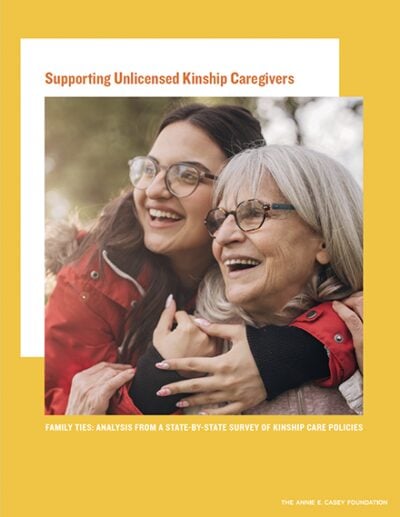Many Unlicensed Kinship Caregivers Are Not Eligible for Foster Care Payments
Only 13 states reported making unlicensed kinship caregivers eligible for foster care maintenance payments.

A comprehensive survey of kinship care policies identifies increasing efforts by states, the District of Columbia and Puerto Rico to promote kinship care and support the kinship caregivers of children and youth known to the child welfare system. Read the policy data and analysis from the survey, fielded in 2022 for the Annie E. Casey Foundation by Child Trends. This is part two of a five-part series of briefs to be released throughout 2024.
To help build an understanding of the full landscape of kinship policies across states and to identify needed improvements, the Casey Foundation asked Child Trends to conduct a survey of state child welfare administrators. The survey updates and expands on the findings of a similarly comprehensive survey conducted in 2007. Agencies in the 50 states, the District of Columbia and Puerto Rico received the 2022 survey; forty-six completed it.
States provide unequal levels of foster care resources, services and financial help to kinship caregivers. Caregivers who are able and willing to become licensed foster parents are most eligible for important resources, including financial assistance. However, many kin who welcome the children placed in their homes by child welfare agencies cannot meet the licensing requirements of their states or jurisdictions. In most states, they are not eligible for and do not receive the financial assistance and support services that would benefit the children.
This brief explores the resources states provide for unlicensed kinship caregivers.
In many states, these caregivers are eligible for less than their peers who can qualify to become licensed foster parents.
A federal regulation change in 2023 has created new opportunities for states to approve more of these kin as licensed foster parents and make them eligible for resources. As states take up these opportunities, policymakers need to understand the gaps in resources, how those gaps can be filled by implementing the new federal rule and how to better support caregivers who are unlicensed.
Supporting Unlicensed Kinship Caregivers discusses state policies that govern:
All children deserve the assistance, services and connections that ensure they will thrive, whether their kinship caregiver is licensed or unlicensed. Many states, however, do not provide the same level of financial assistance or support services to unlicensed kinship caregivers that they give to licensed foster parents. Understanding what states are doing to support unlicensed kinship caregivers can inform new policies and practices. A new federal regulation may help — it allows states to simplify the approval process so more kinship caregivers can qualify to become licensed and eligible for more resources.